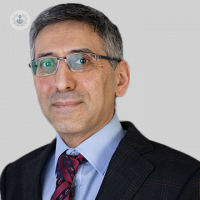What to do about gallbladder pain
Written by:Even though it’s estimated that one in three people will develop gallstones, only one in five that have them will experience any problems.
Leading consultant general and colorectal surgeon, Mr Yüksel Gerçek speaks to Top Doctors about what happens when gallbladder pain manifests and what to do about it.

What causes gallbladder pain?
Gallstones are stones that form in your gallbladder and float there. These stones can block the exit of the gallbladder towards the bile duct and cause biliary colic or cholecystitis. If the stones move from the gallbladder to your common bile duct, they can cause:
- Jaundice (your eyes and skin turning yellow)
- Serious infection of your bile ducts (cholangitis)
- Inflammation of your pancreas (acute pancreatitis)
A more rare condition is not stone related. The gallbladder spasms causing it to empty incorrectly (gallbladder dyskinesia).
What does gallbladder pain feel like?
A gallbladder attack (biliary colic) usually causes a sudden gnawing pain that gets worse. You may feel it in the upper right or centre of your belly, in your back, between your shoulder blades or in your right shoulder. You might also vomit or have nausea. Pain usually lasts 20 minutes to an hour. The pain is constant and isn't relieved by going to the toilet, passing wind or being sick.
An attack is sometimes caused by eating fatty foods. However, they may happen at any time of day and possibly wake you up during the night.
Can you stop a gallbladder attack when it’s occurring?
Nothing can be done to stop an attack when it's happening. Once the gallstone has passed, the pain typically calms down. Applying a heated compress to the area may help to relieve the discomfort. You could also try pain medication (with doctors’ advice) to help ease the pain and anti-nausea drugs to help relieve symptoms.
There are, however, several options available to lower the chance of getting an attack:
- Increase your intake of low-fat foods
- Enjoy a diet high in fibre and wholegrains
- Avoid fatty meat; go for lean cuts and fish
- Eat regularly and have small portions
When should I go to the doctor for gallbladder pain?
The pain shouldn’t be ignored and self-medication with over-the-counter painkillers should be avoided. Speak to a doctor right away if you have any of these symptoms:
- Intense pain
- High fever
- Chills
- Skin yellowing
- Yellowing of the whites of your eyes
How will a doctor diagnose the cause of gallbladder pain?
Your doctor will take a detailed record of your symptoms. This is the most useful part to determine if your symptoms point towards the gallbladder as the cause.
Your doctor will also recommend having blood tests to look for signs of infection or check if your liver is working normally. The liver may not be able to function correctly if gallstones have passed into the bile duct. An ultrasound scan, which uses high-frequency sound waves to create an image of the inside of the body, can usually confirm the presence of gallstones.
It’s sometimes unclear whether any stones have passed into the bile duct when gallstones are diagnosed. Any gallstones that have travelled into the bile duct are sometimes seen during an ultrasound scan. If they're not visible but your tests suggest the bile duct may be affected, you may need an MRI scan (MRCP).
If there is suspicion of gallbladder pain without gallstones (on the ultrasound) your doctor might consider biliary dyskinesia and request a hepatobiliary scintigraphy (HIDA-scan).
What are the treatments for gallbladder pain?
If the pain is mild and infrequent, you may be prescribed painkillers to control further episodes and be given advice about eating a healthy diet to help control the pain.
Surgery to remove the gallbladder is usually recommended if your symptoms are more severe or frequent.
If you’re looking for gallbladder pain advice or treatment, visit Mr Gerçek’s Top Doctors profile here.



